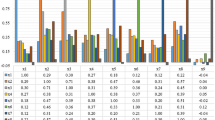Abstract
In this paper four machine learning algorithms are compared in order to predict if a cell nucleus is benign or malignant using the Breast Cancer Wisconsin (Diagnostic) Data Set. The algorithms are K-Nearest Neighbours, Classification and Regression Trees (CART), Naïve Bayes and Support Vector Machines with Radial Basis Function Kernel. Data visualization and Pre- Processing using PCA will help in the understanding and the preparation of the dataset for the training phase while parameter tuning will determine the optimal parameter for every model using R as programming language. Also, 10-fold Cross Validation is used as a resampling method after comparing it with Bootstrapping, as it is the most efficient out of the two. In the end, our comparison shows that the machine learning model that marked the highest Accuracy is the one that is trained using K Nearest Neighbours. Nowadays, one of the most common forms of cancer among women is breast cancer with more than one million cases and nearly 600,000 deaths occurring worldwide annually [1]. It is the second leading cause of death among women and thus it must be detected at an early stage in order not to become fatal [2]. Thus, the importance of diagnosing if a biopsied cell is benign or malignant is vital. However, this process is quite complicated as it involves several stages of gathering and analysing samples with many variables, making the final diagnosis a demanding and timely procedure. The rapid growth of Artificial Intelligence and Machine learning and their implementation in Medicine give us a new perspective in the way we process and analyse medical data. Medical experts can use Data Mining techniques and improve their decision making by extracting useful information from massive amounts of data.
Access this chapter
Tax calculation will be finalised at checkout
Purchases are for personal use only
Similar content being viewed by others
References
Lyon IAfRoC: World Cancer report. International Agency for Research on Cancer Press, pp. 188–193 (2003)
U.S. Cancer Statistics Working Group. United States Cancer Statistics: 1999–2008 Incidence and Mortality Web-based Report. Atlanta (GA): Department of Health and Human Services, Centers for Disease Control and Prevention, and National Cancer Institute (2012)
Wolberg, W.H., Street, W.N., Mangasarian, O.L.: Breast Cancer Wisconsin (Diagnostic) data Set, UCI Machine Learning Repository
Salama, G.I., Abdelhalim, M.B., Zeid, M.A.: Breast cancer diagnosis on three different datasets using multiclassifiers. Int. J. Comput. Inf. Technol. (2277 – 0764), 01(01) (2012)
Padmavati, J.: A comparative study on breast cancer prediction using RBF and MLP. Int. J. Sci. Eng. Res. 2(1), 14–18 (2011)
Zand, H.K.K.: A comparative survey on data mining techniques for breast cancer diagnosis and prediction. Indian J. Fundam. Appl. Life Sci. 5(S1), 4330–4339 (2015). ISSN 2231–6345
Delen, D., Walker, G., Kadam, A.: Predicting breast cancer survivability: a comparison of three data mining methods. Artif. Intell. Med. 34, 113–127 (2005)
Dumitru, D.: Prediction of recurrent events in breast cancer using the Naive Bayesian classification. Ann. Univ. Craiova Math. Comput. Sci. Ser. 36(2), 92–96 (2009)
You, H., Rumbe, G.: Comparative study of classification techniques on breast cancer FNA biopsy data Int. J. Artif. Intell. Interact. Multimedia 1(3), 6–13 (2010)
Akay, M.F.: Support vector machines combined with feature selection for breast cancer diagnosis. Expert Syst. with Appl. 36, 3240–3247 (2009)
Ravi Kumar, G., Ramachandra, G.A., Nagamani, K.: An efficient prediction of breast cancer data using data mining techniques. Int. J. Innov. Eng. Technol. (IJIET) 2(4), 139 (2013)
Kharya, S., Agrawal, S., Soni, S.: Naïve Bayes classifiers: probabilistic detection model for breast cancer. Int. J. Comput. Appl. 92(10), 26–31 (2014)
Timofeev, R.: Classification and Regression Trees (CART) Theory and Applications | Errors and Residuals | Statistical Classification (2004). Scribd. https://www.scribd.com/document/256433144/Classification-andRegression-Trees-CART-Theory-and-Applications. Accessed 2 Nov 2018
Lantz, B.: Machine Learning with R. 2nd edn., pp. 65–87, 89–124, 225–231, 239–247, 293–311, 315–324. Packt Publishing, Birmingham (n.d.)
Barber, D.: Bayesian Reasoning and Machine Learning, pp. 203–213. Cambridge University Press, New York (2012)
Gunn, S.R.: Support Vector Machines for Classification and Regression (1998)
Mitchell, T.M.: Machine Learning, pp 52–75, 156–177, 230–244. McGraw-Hill Science/Engineering/Math, New York, 1 March 1997
Jolliffe, I.T.: Principal Component Analysis, 2nd edn., pp. 10–29, 111–127. Springer, New York (2002). https://doi.org/10.1007/b98835
Author information
Authors and Affiliations
Corresponding author
Editor information
Editors and Affiliations
Rights and permissions
Copyright information
© 2020 Springer Nature Switzerland AG
About this paper
Cite this paper
Kaklamanis, M.M., Filippakis, M.Ε., Touloupos, M., Christodoulou, K. (2020). An Experimental Comparison of Machine Learning Classification Algorithms for Breast Cancer Diagnosis. In: Themistocleous, M., Papadaki, M. (eds) Information Systems. EMCIS 2019. Lecture Notes in Business Information Processing, vol 381. Springer, Cham. https://doi.org/10.1007/978-3-030-44322-1_2
Download citation
DOI: https://doi.org/10.1007/978-3-030-44322-1_2
Published:
Publisher Name: Springer, Cham
Print ISBN: 978-3-030-44321-4
Online ISBN: 978-3-030-44322-1
eBook Packages: Computer ScienceComputer Science (R0)




